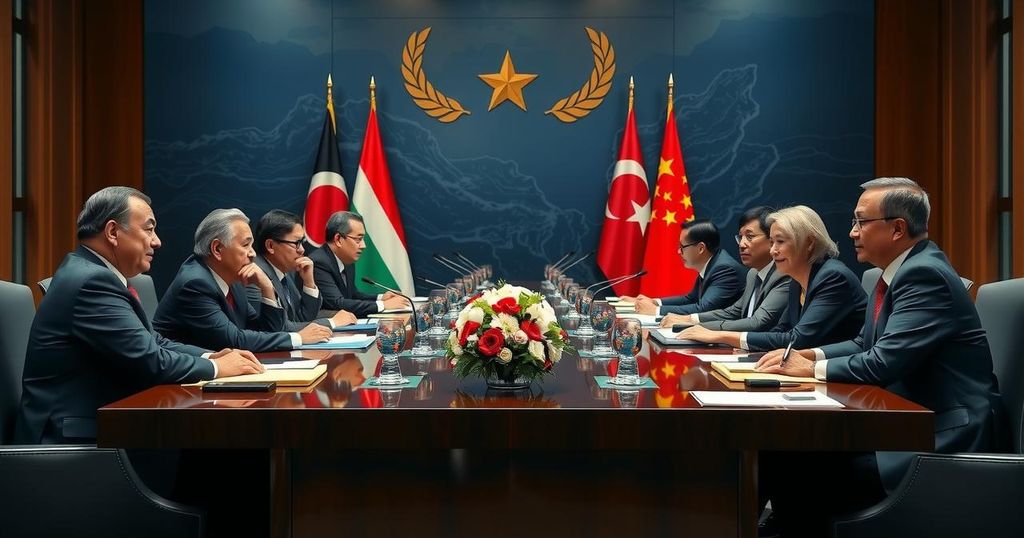Russian President Vladimir Putin hosted the BRICS Summit in Kazan, Russia, where he and leaders from countries like China and India discussed creating a “new world order” to lessen dependency on the U.S. dollar and Western power. The summit emphasized enhanced cooperation among member states to defy Western economic sanctions and foster stability, as they explored alternatives to existing financial systems.
This week, during the BRICS Summit held in Kazan, Russia, President Vladimir Putin gathered representatives from over two dozen nations to discuss a vision for a “new world order” that seeks to diminish Western influence and the dominance of the U.S. dollar. The summit, which ran from Tuesday to Thursday, represents Putin’s significant international engagement since the onset of the conflict in Ukraine, as the alliance aims to reduce dependencies on the dollar and mitigate the impact of sanctions from the United States and its allies. At the summit, President Putin remarked on the use of the dollar as a weapon, stating, “The dollar is being used as a weapon. We really see that this is so. I think that this is a big mistake by those who do this.” Notably, Chinese President Xi Jinping and Indian Prime Minister Narendra Modi utilized the occasion to reinforce their bilateral relations, particularly after reaching agreements to resolve longstanding territorial disputes. The BRICS coalition, originally comprising Brazil, Russia, India, China, and South Africa, has expanded rapidly, welcoming new members such as Iran and Saudi Arabia earlier this year. With a membership totaling half of the world’s population and accounting for 35% of global economic output, the bloc positions itself as a formidable counterweight to Western interests, even as some member nations continue to receive U.S. aid. Furthermore, the summit was seen as a strategic platform to promote cooperation amongst its members and to explore alternatives to the SWIFT payment system, which has been utilized to impose sanctions on Russia. While some members advocate for a collaborative approach to reform international financial institutions, akin to the World Bank and IMF, concrete strategies to replace the dollar remain unspecified. Iranian President Masoud Pezeshkian urged BRICS to transform into a decisive force rather than merely a “dialogue club,” critiquing Western practices that he believes perpetuate instability. Currently, dollar assets constitute approximately 59% of global reserves, slowly declining since 1999. Former U.S. President Donald Trump has highlighted that losing the dollar’s status as the world currency would be detrimental to U.S. interests, comparing such a loss to a war defeat.
The BRICS Summit is a notable annual assembly where member countries convene to discuss economic cooperation and strategic partnerships. Initially conceptualized by financial analysts at Goldman Sachs, the BRICS concept embodies the increasing clout of emerging economies on the global stage. With a focus on crafting an alternative international economic order, the summit’s discussions often revolve around reducing Western economic dominance and enhancing collaboration among non-Western nations. The ongoing geopolitical tensions, notably those involving Russia and Western nations, have amplified the urgency for BRICS countries to reassess their positions and alliances in response to sanctions and economic pressures. The current global economic landscape, characterized by shifting power dynamics, necessitates that BRICS nations explore new avenues for cooperation and economic resilience.
The recent BRICS Summit highlights a pivotal moment for the participating nations as they strive to establish a coherent strategy for global representation that diminishes Western hegemony. By advocating for alternatives to the U.S. dollar and seeking to reform international institutions, BRICS countries aim to redefine their roles in the global economy. The collaboration among these nations, particularly in the wake of geopolitical tensions and financial sanctions, underscores a growing consensus on the need for a multipolar world. As the alliance continues to evolve, the effectiveness of their strategies will be crucial in determining their influence on future international economic policies.
Original Source: www.foxnews.com






